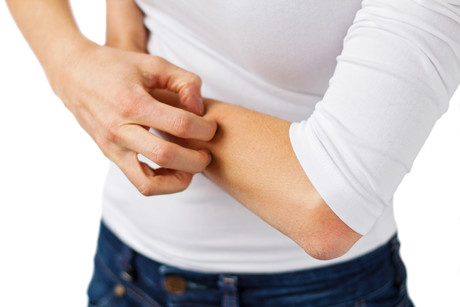Hard water can cause eczema

Hard water can damage the skin, causing skin conditions such as eczema to develop, according to new research from the UK.
Exposing our skin to hard water damages the skin barrier, which acts as our defence against outside threats such as bacteria or sunburn. The exposure increases the sensitivity of the skin to everyday wash and beauty products.
A new study from the University of Sheffield and King’s College London showed that hard water contains high levels of calcium and magnesium ions that bind to particles in soap, causing them to stay on the skin and causing irritation.
Skin pH is normally acidic but hard water has high alkalinity, which means it can raise the skin surface pH. A shift towards alkaline pH disturbs the skin’s natural function as a physical barrier and leaves it prone to exposure of harmful bacteria, which can cause infection.
Dr Simon Danby, from the University of Sheffield’s Department of Infection, Immunity and Cardiovascular Disease, said: “By damaging the skin barrier, washing with hard water may contribute to the development of eczema.”
Symptoms of eczema (also called ‘atopic eczema’ or ‘atopic dermatitis’) include inflamed, dry, itchy skin and often secondary skin infections, which can affect any part of the body and every aspect of a person’s life — both physically and emotionally.
The team of researchers examined whether removing the calcium and magnesium ions using an ion-exchange water softener could halt the negative effects. They found that using a water softener reduces the harmful effects of surfactants, potentially decreasing the risk of developing eczema.
The study has been published in the Journal of Investigative Dermatology.
2026 HESTA Excellence Awards — nominations open
Nominations have opened for the 2026 HESTA Excellence Awards, which encompass the aged care,...
Hospital fined $230K after aged care chair detachment
A hospital has been fined $230,000 over an incident involving a 93-year-old aged care resident...
Alliance to lay foundations for national creative health infrastructure
Creative Health Alliance Australia launched this month, in order to lay the foundations for...



![[New Zealand] Transform from Security Awareness to a Security Culture: A Vital Shift for SMB Healthcare — Webinar](https://d1v1e13ebw3o15.cloudfront.net/data/89856/wfmedia_thumb/..jpg)
![[Australia] Transform from Security Awareness to a Security Culture: A Vital Shift for SMB Healthcare — Webinar](https://d1v1e13ebw3o15.cloudfront.net/data/89855/wfmedia_thumb/..jpg)




